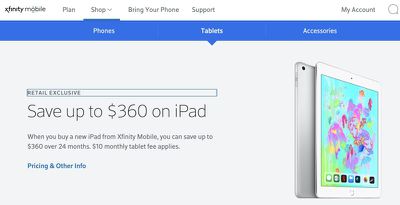As part of the deal allowing cable companies Comcast and Charter to sell iPhones for their respective mobile services, Apple has required them to also sell large numbers of other devices, reports CNBC.
Both Comcast and Charter have wireless services as part of an MVNO agreement with Verizon. Comcast offers Xfinity Mobile with approximately 1.5 million subscribers, while Charter offers Spectrum Mobile with approximately 300,000 subscribers.

The two cable companies wanted to be able to offer the iPhone in an effort to better compete with the four major carriers in the United States -- Sprint, Verizon, AT&T, and T-Mobile -- and as part of the deal allowing Comcast and Charter to sell iPhones, Apple made them agree to sell other devices too.
The iPhone's popularity made it impossible for Xfinity Mobile and Spectrum Mobile to compete without offering it, according to CNBC's sources, which meant Apple had "ample leverage" in deal negotiations.
Specific terms of the two deals are not known, but Comcast is required to sell a certain number of iPads, which CNBC says is in the thousands, at a subsidized cost. Comcast is required to pay the difference between the discounted price and the retail price.
Comcast offers the cellular 6th-generation iPad for $422.99, a discount from the standard $459 price. Comcast also sells cellular versions of the 10.5-inch iPad Pro, the 10.5-inch iPad Air, and the 7.9-inch iPad mini, all at discounted prices.
Subscribers are promised a $15 per month credit applied to their monthly statement for any iPad purchased.
Charter's deal is different and involves the Apple TV, which Charter offers as an alternative to a traditional cable box.
Charter sells Apple TVs at $7.50 per month for 24 months - or $180, the retail cost of an Apple TV. Alternatively, a customer can lease a Charter set-top box for $7.50 per month. In other words, Charter offers an Apple TV at the same price as a Charter set-top box, but a customer ends up owning the Apple TV and returning the Charter box. Charter has become the largest third-party seller of Apple TVs because of the agreement, two of the people said.
According to CNBC, there are benefits in these deals for Comcast and Charter beyond being able to offer the iPhone. iPads and Apple Watches "enhance the value" of the Comcast wireless service, and the Apple TV offers a better navigation interface for Charter customers.
Many of Apple's carrier partners around the world also sell Apple devices other the iPhone, much like Charter and Comcast.




















